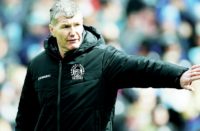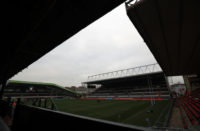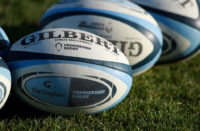 Argentina have received an early reminder that New Zealand, South Africa and Australia see them as the poor relations of the inaugural southern hemisphere Rugby Championship.
Argentina have received an early reminder that New Zealand, South Africa and Australia see them as the poor relations of the inaugural southern hemisphere Rugby Championship.
The message is unmistakeable because on the trip back from their first assignment – away to South Africa in Cape Town – the Pumas will be second in the pecking order, irrespective of whether they spring a big upset by winning on the road in the first match of the tournament.
When the teams fly back over the South Atlantic for the return leg of the double-header, scheduled for Mendoza the following weekend, it will be the Springboks who get the superior treatment, making landfall in Buenos Aires a good three hours before their hosts, having been allocated the bulk of the business-class seats on the only direct flight between Johannesburg and the Argentine capital.
The Pumas, meanwhile, will be on a flight which is routed via São Paulo in Brazil.
Being relegated to second-class citizen status should be a powerful motivational tool, but, even so, Argentina's record against South Africa does not inspire confidence that they will get off to a winning start. Victory at Newlands would be historic, because the Pumas have not beaten the Springboks in any of the 13 Tests played between the two countries. They did register a rare success in 1982, winning one of the unofficial Tests played in the apartheid era in the guise of the South American Jaguars, but the other seven matches were lost.
However, history books are there to be rewritten, and the Argentines claim that they are in better shape going into the Rugby Championship than they have been for anything other than the last two World Cups. Just as in 2007, when the Pumas took the global game by storm to finish third in the tournament, they have been training in Pensacola, Florida. In that instance, as now, they enlisted the help of a firm of American conditioning and fitness specialists, Athletes Performance, to get them in peak shape for the start of the tournament.
The noises filtering out of the Pumas camp are that their elite squad is stronger, fitter and heavier than ever, after being put through its paces by a conditioning team which has worked with NFL, NHL and Olympic athletes.
The added bonus is that there have been no snags over the availability of their European-based players. The Argentine union (UAR) struck a deal with the French and English clubs that any of the players made available for the June tests against Italy and France would not be required for the heavy duty business against the SANZAR big three.
This enabled Argentina's 24 leading players – all of them European-based – to have a clear month-long break, as agreed under regulation nine, before reporting for duty with their country at the beginning of July.
As a result the Pumas coach, Santiago Phelan, has the luxury of having his players in camp for six weeks prior to the start of the new four-cornered tournament. While the Argentines will not have had the benefit of being match-hardened by the final stages of the Super 15 like the New Zealanders, South Africans and Australians, they will at least have had a respite from the gruelling slog of the French Top 14 and the English Premiership.
This should ensure that Argentina are relatively fresh when they meet their traditional bogey team, South Africa – and none will be raring to go more than Juan-Martin Hernandez. Four years ago during the World Cup in France, Hernandez was proclaimed as one of the world's great players after a run of outstanding performances in the Pumas No.10 jersey, but since that time the Argentine all-rounder – who is equally at home at fly-half, centre or full-back – has endured a series of injuries which has seen him play only in fits and starts.
Having signed a one-year contract with the Sharks in 2009, Hernandez was sidelined for six months of it after a back operation, meaning that he was never able to make the impact he wanted with the Natal-based franchise. To make matters worse no sooner had he returned to action in Europe after joining the Parisian club, Racing Metro, than he was ruled out of the 2011 World Cup with a knee injury.
Argentine rugby fans will be hoping fervently that Hernandez, who turns 30 just before the start of the Championship, stays fit long enough to bring his silky skills to bear. The same is true of Phelan, who says that it is a huge boost to have Hernandez back.
“He adds a lot in every way, as a player, as a person, and as a natural leader. He is a player with many attributes and has the equipment for the game we're trying to accomplish. He is training with great enthusiasm, and is in very good condition. It is important news,” he said.
The most likely option is that Hernandez will play at fly-half, with the curtain finally coming down on the career of Felipe Contepomi, who is five years his senior. Many of Hernandez's countrymen will be hoping that the player nicknamed ‘El Mago' (The Magician) gets the opportunity to take his current total of 32 caps closer to Contepomi's 78, and in the process helps Argentina to implement the tactical blueprint that their new technical consultant, Sir Graham Henry, has suggested.
The 2011 World Cup-winning New Zealand coach has been signed for seven weeks by the Argentines, with the specific aim of improving their attacking play and delivering more tries, rather than relying on goal-kicking as their main points-scoring weapon.
There were two weeks of Henry input in June, with the remainder from the beknighted Kiwi to come in the build-up to the Rugby Championship once his stint as a consultant to the New Zealand Olympic squad is over.
Phelan says that Henry's main message to the Pumas is to have a smaller play-book, but to do what's in it better. “There are less variations in the sense of the amount of moves, but we must be sure they are well executed…. We are training to play a simple pattern of rugby, and we're working hard on the players' individual technique. We intend to play a more frontal style of rugby with the forwards carrying more.”
The Pumas will have the chance to put the training into practice with two warm-up games scheduled against Stade Francais, who are on tour in Argentina in early August, the first in Buenos Aires (August 4, Velez Sarsfield) and the second in Santa Fe (August 10). Contepomi's probable inclusion in the Stade party adds a certain curiosity value to the proceedings, as does the banana-skin quotient in Argentina's choice of an illustrious French club side as their pre-tournament opponents.
Phelan says he aims to use the matches against Stade to get his team up to speed: “We will find the pace of the game hard against Stade Francais because even if you train in game-like situations, it is not the same. Last year when we went to Wales, the players were tired from the hard work they had done physically (in Pensacola). We know that's part of the preparation, and that it is good to play against a team of the level of Stade Francais.”
Leading the charge will be new captain, Juan-Martin Fernandez Lobbe. The Toulon back-rower is likely to be at No.8 for his country, and Phelan says that the positive outlook he brings is infectious – which is just as well when you consider that Fernandez Lobbe's nickname translates from Spanish as “Cork”, apparently on account of his big head and slim body as a child being reminiscent of a champagne cork. “As a leader and captain ‘Cork' is developing in a very good way. He is a very positive person, which spreads to the squad, and he is also very fit and hard-working,” says Phelan.
Argentina will need every ounce of what Fernandez Lobbe's heart, legs and lungs, and those of his team-mates, can deliver, because there is little doubt that the Super 15 – like the summer Tests – has been played a couple of gears faster than the grindingly attritional French Top 14, where the bulk of the Pumas ply their trade.
The superior speed and intensity of the Springboks, All Blacks and Wallabies was what saw each of them to series victories over the Six Nations touring sides in June, and while Argentina look capable of measuring up in the forwards at scrum and lineout, it will be their ability in the loose that will be decisive.
The Pumas have a world-class lock in Patricio Albacete, and, if Hernandez hits the ground running, at fly-half. Fernandez Lobbe can be inspirational, as can the twin strike force of full-back/wing Lucas Amorosino and the Exeter Chiefs wing, Gonzalo Camacho. However, if they are to finish the first Rugby Championship with a couple of wins from their six home and away encounters, new heroes will have to emerge.
NICK CAIN
One Comment
Leave a Comment
You must be logged in to post a comment.



























Pingback: click to investigate